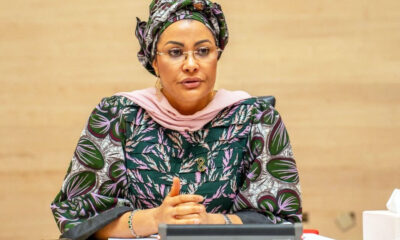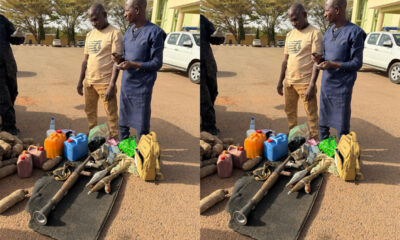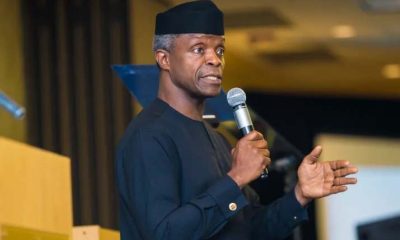Business
Osinbajo: We’re working to prioritise investment in agriculture

The Vice President, Prof Yemi Osinbajo (SAN), on the 29th of April, said Nigeria is prioritising innovation and technology investments in agriculture so as to transform the sector by attracting young people and scale up productivity.
According to a statement issued by Senior Special Assistant to the President on Media and Publicity, Office of the Vice President, Mr Laolu Akande, Osinbajo stated this in a remark he delivered virtually at the 2021 High-Level Dialogue on Feeding Africa.
The event is organised by the African Development Bank (AfDB) and the International Fund for Agricultural Development (IFAD), in partnership with the Forum for Agricultural Research in Africa (FARA) and the CGIAR System Organisation with the theme “Feeding Africa: leadership to scale up successful innovations.”
Highlighting the programmes of the government to ensure agricultural transformation in Nigeria, Prof. Osinbajo listed the Economic Sustainability Plan, National Livestock Transformation Plan and Green Imperative Project, among other initiatives.
He said: “At the heart of Nigeria’s post COVID-19 recovery plan, or what we describe as our Economic Sustainability Plan is an Agriculture for Food and Jobs Plan (AFJP) where we seek to leverage suitable technologies to build a resilient food system for Nigeria especially in the light of the economic, health and food supply chain devastations caused by the pandemic. Implementation is well underway and we have quite a few impressive results already.”
Further, the Vice President said during the COVID lockdowns, “we trained and deployed over 34,000 young graduates all over the country, covering over 8,000 local government wards in 774 local government areas. Each of these young men and women had a locally developed app on smartphones and electronic tablets to digitally register farmers and map out their farm GIS coordinates.
“So, we have registered and mapped about 6 million small-holder farmers to their farmlands and we are also currently collecting 200,000 composite soil samples from these farms to be analyzed in 22 local soil laboratories to guide local fertilizer blending”, he said.
Continuing, Osinbajo said “on the back of the farmer-farm database which we developed, we are creating a digital Agriculture Exchange Programme (AgExchange), working with the Alliance Rabobank and MasterCard in collaboration with some local FinTech companies. These FinTech companies (FarmCrowdy, Infinera, CropIT) are run by young Nigerians.
“The AgExchange will be an ecosystem or one-stop-shop for providing a range of services and products to small-holder farmers such as real-time e-subsidies, credit-connect by providing credit score of farmers on the platform and linking them to financiers, insurance services, market place services for connecting producers, aggregators and off-takers based on competitive market prices. Input suppliers, weather, pests, and disease indexing services will be provided on the exchange as well. The budget for the Agriculture for Food and Jobs Plan AFJP is $1.5billion.”
On the National Livestock Transformation Plan (NLTP), Prof Osinbajo noted that the focus is on “transiting gradually from nomadic system of cattle production to the more sedentary method of ranching. This will involve training pastoralists in new ways of producing and rearing cattle sustainably to address the challenges of resource-based violent conflicts between crop farmers and cattle herders, and the generally low milk and beef productivity of indigenous cattle breeds.”
The Vice President explained that “an indigenous technology company has developed a microchip for tracking the cattle and we are working on a pilot project with one of our development partners – the Netherlands government.”
“All the energy on the ranches will be from biogas from cattle dung and solar power. The ranch will be an integration of crops, pasture, and trees. The crops for the need of the pastoral household, the trees to fight desertification and enhance carbon sequestration rather than emission.
“Funding for this is from budgets of the Federal and State governments and bilateral support from development partners such as the Netherlands. The initial sum is in the order of 280 million USD,” he added.
Regarding the Green Imperative Project (GIP), the Vice President said that the €995 million, a 5-year project which is funded by the Import/Export Bank of Brazil (BDES) with support from Deutsche Bank, Islamic Development Bank, and others, will aim at agriculture technology transfer from Brazilian Original Equipment Manufacturers (OEMs), Research and Training Institutes to Nigeria’s entrepreneurs, Research Institutes and businesses.
“The project involves the reactivation of dormant or partially operational privately owned agricultural equipment, assembly plants, establish 632 privately-owned primary production support service centers to sell farm mechanization services to smallholder and commercial farmers to address low productivity issues.
“Part of the plan also is the establishment of 142 privately owned agro-processing service centres which will be to address post-harvest losses, path to market and supply chain challenges, and train about 100,000 new extension agents to address farmer advisory service delivery challenges with new technology and practice adoption”, he said.
“An important feature of our strategy is encouraging our young techprenuers into agriculture and AGRO services and we are enjoying some success with the technology for our AGRO exchange, and our Central Bank is also licensing FinTech companies using mobile technology platforms.
“Some of them have been able to give non-collateral credit using credit scoring algorithms to determine credit worthiness of farmers. This is a very important part of our whole financial inclusion project because these FinTech companies are able to reach farmers practically anywhere, rate them using their credit scoring algorithms and get credits across to them in many of the far-flung areas,” the VP explained.
Other African leaders who spoke at the event included President of the Democratic Republic of the Congo, Félix-Antoine Tshisekedi Tshilombo; President of Senegal, Macky Sall; President of Mali, Bah N’Daw; President of Burkina Faso, Roch Marc Christian Kaboré; Prime Minister of Sudan, Dr. Abdalla Hamdok; President, Federal Democratic Republic of Ethiopia, Sahle-Work Zewde; Prime Minister of Sudan, Dr. Abdalla Hamdok, among others.
Other speakers included President of the African Development Bank, Dr Akinwunmi Adesina; Former UK Prime Minister, and Executive Chairman of the Institute for Global Change, Mr Tony Blair; President, International Fund for Agricultural Development (IFAD), Gilbert F. Houngbo and the Special Envoy of the UN Secretary-General on 2021 Food Systems Summit, Ms Agnes Kalibata, among others.
Business
NNPC Raises Petrol Price to ₦933 in Lagos, ₦960 in Abuja

NNPC Raises Petrol Price to ₦933 in Lagos, ₦960 in Abuja
The Nigerian National Petroleum Company Limited (NNPC) has increased the pump price of petrol at its retail stations to ₦933 per litre in Lagos and ₦960 per litre in Abuja, triggering fresh concerns among motorists and businesses over rising fuel costs in Nigeria.
The national oil company raised the price by ₦103 in Lagos, moving from ₦830 per litre to ₦933, while motorists in the federal capital Abuja now pay ₦960 per litre, representing an ₦85 increase from the previous ₦875 price.
Checks on Wednesday showed that the new petrol price has already been implemented at several NNPC retail outlets, including stations at Apple Junction and Ago Palace Way in Lagos, while stations along Airport Road in Lugbe, Abuja, were dispensing petrol at the new ₦960 rate.
The latest fuel price hike comes shortly after the Dangote Petroleum Refinery increased its ex-gantry petrol price to ₦874 per litre on March 2, up from ₦774 per litre, a development that has influenced retail pricing across the downstream petroleum sector.
Industry analysts say the rise in petrol prices in Nigeria is closely linked to growing geopolitical tensions in the Middle East, which have unsettled global energy markets and pushed up crude oil prices.
READ ALSO:
- Yul Edochie Blasts Arise TV Anchor Rufai Oseni in Viral Video
- Court Discharges Abba Kyari, Brothers in NDLEA Non-Disclosure of Assets Case
- Kano State House of Assembly Initiates Impeachment Proceedings Against Deputy Gov
Recent market data shows that Brent crude oil rose to about $85 per barrel on March 3, compared with around $72 per barrel recorded on February 28, intensifying pressure on petrol landing costs for markets that still rely partly on imports.
Experts note that Nigeria’s deregulated fuel market means pump prices now fluctuate in response to international oil prices, exchange rate volatility, and supply chain costs.
Meanwhile, the Petroleum Products Retail Outlets Owners Association of Nigeria (PETROAN) has called on the federal government to ensure steady crude oil supply to domestic refineries, particularly as Nigeria seeks to strengthen local refining capacity.
The association warned that continued instability in global oil markets could weaken the naira, raise petrol prices further, and push inflation higher, thereby worsening the cost-of-living challenges faced by Nigerians.
Energy stakeholders have also stressed the importance of expanding local refining operations, including production from the Dangote refinery and rehabilitation of government-owned refineries, to reduce dependence on imported fuel.
The latest price adjustment reflects the ongoing transition in Nigeria’s downstream petroleum sector following the removal of fuel subsidies and the adoption of a market-driven pricing system.
Motorists across Lagos, Abuja and other major cities have expressed concern that rising petrol prices could increase transportation costs, food prices and overall inflation, placing additional pressure on households and businesses.
NNPC Raises Petrol Price to ₦933 in Lagos, ₦960 in Abuja
Business
TCAN Targets Logistics Reforms to Drive Economic Growth at 2026 Transport Summit

TCAN Targets Logistics Reforms to Drive Economic Growth at 2026 Transport Summit
The Transportation Correspondents Association of Nigeria (TCAN) has begun preparations for its 2026 Annual Transport Summit, placing Nigeria’s logistics value chain at the centre of national economic discourse.
Scheduled for September 2026 in Lagos, the summit will be held under the theme, “Unlocking Economic Growth Through Transportation Logistics.”
It is expected to draw major stakeholders across the aviation, maritime, rail and road transport sectors, alongside logistics service providers, policymakers, regulators, development partners and financial institutions.
In a statement, TCAN said the summit would critically examine how efficient transportation logistics can serve as a catalyst for sustainable economic growth, trade facilitation, job creation and regional integration, especially in the context of ongoing reforms and infrastructure investments within the sector.
Chairman of TCAN, Tola Adenubi, described transportation logistics as the backbone of economic development, stressing that the performance of Nigeria’s logistics ecosystem directly impacts the nation’s competitiveness.
“From cargo handling at airports and seaports to inland freight movement and last-mile delivery systems, the efficiency of Nigeria’s logistics architecture plays a decisive role in determining the competitiveness of the nation’s economy,” Adenubi said.
He noted that the 2026 summit would explore innovative strategies to strengthen the sector, including digital transformation, infrastructure financing models, public-private partnerships and regulatory reforms aimed at optimising performance.
Chairman of the 2026 Conference Committee, Suleiman Idris, said the summit would feature high-level panel discussions, keynote addresses and interactive sessions designed to assess the current state of Nigeria’s transportation logistics framework.
According to him, deliberations will focus on identifying bottlenecks hindering seamless cargo and passenger movement, examining the impact of multimodal transport integration on economic expansion, and highlighting investment opportunities within the logistics and supply chain ecosystem.
Idris added that experts at the summit would also provide policy recommendations targeted at enhancing operational efficiency and boosting Nigeria’s global competitiveness in trade and transportation.
As part of the programme, TCAN will confer its Champions of Transport Industry Development (COTID) certificates on selected government agencies and private operators that have made significant contributions to the advancement of Nigeria’s transportation sector.
Over the years, the TCAN Annual Transport Summit has evolved into a credible platform for constructive engagement between regulators, operators and other industry stakeholders.
The association said the 2026 edition aims to deepen policy conversations, promote transparency and accountability, and accelerate reforms capable of unlocking the full economic potential of Nigeria’s transport and logistics industry.
With logistics increasingly recognised as a key enabler of economic growth, industry observers expect the 2026 summit to set the tone for fresh strategies that could reshape Nigeria’s transportation landscape in the years ahead.
Business
Petrol Jumps to ₦937 in Lagos, ₦975 in Abuja Amid Middle East Oil Crisis

Petrol Jumps to ₦937 in Lagos, ₦975 in Abuja Amid Middle East Oil Crisis
Nigeria’s fuel market is under renewed strain as escalating tensions in the Middle East push global crude oil prices above $80 per barrel, driving domestic petrol prices toward the ₦1,000 per litre mark. Motorists across the country, from Lagos to Abuja, have woken to sharp increases at filling stations, with pump prices rising almost overnight.
In Lagos, several outlets raised the price of Premium Motor Spirit (PMS) from ₦830–₦835 per litre to ₦937, while in the Federal Capital Territory, major retailers including NNPC Limited and MRS Oil Nigeria Plc increased prices from ₦875 to ₦975 per litre. Independent marketers were dispensing fuel at about ₦960 per litre, reflecting the immediate effects of rising international oil prices.
The surge followed a fresh upward review in the ex-depot price by Dangote Petroleum Refinery & Petrochemicals, which moved its gantry price from ₦774 to approximately ₦874–₦875 per litre. Industry insiders linked the hike to rising replacement costs and the ongoing surge in crude prices. A senior refinery official confirmed that petrol loading operations were temporarily suspended earlier in the week, further tightening supply expectations and accelerating retail price adjustments.
READ ALSO:
- US Military Says It Has Struck Nearly 2,000 Targets in Iran as War Escalates
- FG Bans Roadblocks, Cash Tax Collection Nationwide
- Trade Row Looms as Trump Threatens Spain After Refusal to Support Iran Strikes
The Middle East conflict, particularly involving the United States, Israel, and Iran, has heightened fears of disruption around the Strait of Hormuz, a strategic maritime route responsible for nearly one-fifth of global crude supply. Analysts warn that prolonged instability in the corridor could push global oil prices to $100 per barrel or higher, with direct consequences for Nigeria’s cost-reflective petrol pricing system.
The Petroleum Products Retail Outlets Owners Association of Nigeria (PETROAN) described the situation as worrisome, noting that rising crude prices inevitably feed into domestic pump prices, given the current deregulated pricing regime. PETROAN’s National President, Mr Billy Gillis-Harry, emphasized the urgent need to strengthen Nigeria’s domestic refining capacity as a protective buffer. The association also called for consistent crude supply to local refineries and accelerated rehabilitation of the country’s four state-owned refineries to cushion the economy against external shocks.
For Nigerians, the impact has been immediate. Commercial drivers and commuters report that rising fuel costs are forcing them to adjust transport fares, adding pressure to household budgets. “I bought fuel yesterday at ₦875, and this morning it is ₦975. Every increase affects us directly. If we don’t raise fares, we run at a loss,” said Mr. Chinedu Okeke, a driver in Abuja.
Commuters fear the ripple effect of higher petrol costs on everyday goods. “If fuel is almost ₦1,000 per litre, it means fares and prices of essentials will rise. Things are becoming unbearable,” said Mrs. Aisha Ladan, a civil servant in the capital city. Analysts warn that increased transport costs could widen inflationary pressures, as businesses pass on higher operational expenses to consumers.
The psychological impact of petrol nearing the four-digit mark is also significant. For many Nigerians, it represents another milestone in a period already marked by subsidy removal, currency volatility, and persistent price adjustments. Unless global energy markets stabilize or domestic refining capacity is expanded, petrol prices in Nigeria may soon cross ₦1,000 per litre, with broad implications for the economy.
Petrol Jumps to ₦937 in Lagos, ₦975 in Abuja Amid Middle East Oil Crisis
-

 News2 hours ago
News2 hours agoFG Approves Medical Fellowships as PhD Equivalent in Nigerian Universities
-

 metro6 hours ago
metro6 hours agoLeadership Reshuffle: IGP Tunji Disu Removes Hundeyin as Nigeria Police Force PRO
-

 metro10 hours ago
metro10 hours agoIslamic Scholar Barred From Ramadan Tafseer After Criticising Tinubu, Governors
-

 metro1 day ago
metro1 day agoHow Ikwechegh’s ₦1.15tr Interrogation Led to Tinubu’s Cabinet Shake-Up
-

 metro5 hours ago
metro5 hours agoPolice Announce Dates, Requirements for 2026 Constable Recruitment Screening
-

 metro3 days ago
metro3 days agoDSS Busts Alleged Arms Trafficking Network in Gombe, Seizes RPGs
-

 Politics2 days ago
Politics2 days agoAtiku’s Son Resigns as Adamawa Commissioner Following Fintiri’s APC Defection
-

 News2 days ago
News2 days agoRelief Radiant Hearts Foundation Launched in Iwo, Promises Hope for the Vulnerable













